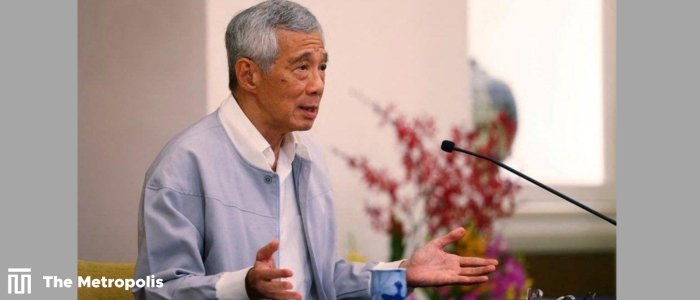A string of political scandals in Singapore casts doubt on when Prime Minister Lee Hsien Loong can hand over the leadership reins (Reuters)
Metropolis Desk-
Several unprecedented political scandals have shaken Singapore, a country renowned for its political stability. The first senior minister to be charged in a corruption inquiry in forty years was detained last week.
And on Monday, two politicians resigned after it came to light that they were having an extramarital relationship, one of whom was once considered a prospective prime minister.
Residents of the city-state, which takes pleasure in having the world’s highest-paid officials and a reputation for good governance, are astonished by it.
The ruling People’s Action Party (PAP), which has been in power since 1959 and has a sizable majority in parliament, may lose support as scandals continue to develop, according to analysts.
They add that it raises questions about the timing of Prime Minister Lee Hsien Loong’s ability to transfer power.
Tan Chuan-jin, the speaker of the House of Representatives, 54, and Cheng Li Hui, a fellow politician, 47, resigned from the party and the legislature on Monday due to their “inappropriate relationship.” Ms. Cheng is unmarried, whereas Mr. Tan is married.
When Singapore’s anti-corruption watchdog detained billionaire hotelier Ong Beng Seng and Transport Minister S Iswaran last week, new issues about transparency surfaced. The two men were instrumental in getting the 2008 Grand Prix to Singapore. Singaporeans were informed last Wednesday that Mr. Iswaran had been asked to take time off from his ministerial responsibilities due to an investigation.
According to local media, deputy prime minister Lawrence Wong promised that the corruption investigation would be “full, thorough, and independent” and that nothing will be hidden.
However, the announcement of the arrests by the authorities came three days after the fact. Both individuals are out on bond and have not been charged. Following charges that two other top ministers had rented colonial-era bungalows in a posh neighborhood for less than market value, arrests followed.
The two individuals, K Shanmugam and Vivian Balakrishnan were cleared of wrongdoing by an anti-graft probe, but the case prompted a contentious discussion about political optics and inequality in Singapore.
The unexpected sequence of events has given rise to the expected memes. The owners of the Instagram page yeolo.sg stated on Monday that “the writers of this season of Singapore have outdone themselves.”
A different post with a picture of actresses gathered around a laptop on the Barbie movie set said, “When I and the girlies are suddenly interested in sg politics.” Another Instagram user mockingly compared the state of the country’s politics to spilling tea or spreading rumors.
Beyond the jokes, however, are serious concerns about the PAP’s future and its ability to maintain the confidence of Singaporeans.
Similar scandals have hit it recently; in the past ten years, both the Speaker of the House and a backbencher have resigned due to extramarital affairs. However, voters’ scrutiny has increased due to the scandals’ proximity and the corruption investigation.
The PAP has traditionally taken pride in holding its legislators to high moral standards and in being able to maintain order inside the party. Joining the PAP has been equated to becoming the priesthood by one of its founding members.
This Monday, Mr. Lee defended the way his party handled the latest scandals, saying it showed “how the system has to work.” He continued, “High standards of propriety and personal conduct… are the fundamental reasons Singaporeans trust and respect the PAP. Sometimes things cluster up, but we make sure we put them right.”
However, other analysts argue that these scandals call Singapore’s – and particularly the PAP’s – claims to have exceptional governance into question.
“I think the biggest questions surround restraints on authority, oversight, transparency, the impartiality of parliamentary process as well as the PAP’s claim that it is a sufficient check on itself,” said Singapore-based political scientist Ian Chong. He noted that the PAP has rejected political practices common in other developed jurisdictions, such as public disclosure of income and assets by political office holders, senior civil servants, and their immediate family members.
There are no robust mechanisms for holding powerful people to account, added Michael Barr, an Australia-based international relations professor who has written several books on Singapore politics.
“You just have to trust them. That is why this is such a dangerous and novel set of developments for the government. They are trashing their repositories of public trust,” he said.
Singapore is ranked the fifth-least corrupt country in Transparency International’s latest Corruption Perceptions Index. Over the years, the government has justified seven-figure ministerial paychecks as a way to repress corrupt activity.
But Dr. Barr pointed out: “Without extraordinary levels of public trust, the government must rely on one of two things to win elections: either repression and other measures that subvert democracy, or a high level of performance-based legitimacy. Their record in recent years is such that we can forget about performance legitimacy.” The recent events also cast doubt on when Mr. Lee would step down.
The 71-year-old, who has served as prime minister since 2004, has frequently expressed a desire to step down. The finance minister Lawrence Wong has already been named as the replacement. However, Mr. Lee stated on Monday that he has no plans to call for an emergency general election. By November 2025, the next elections must be held.
Concerns about Mr. Wong and his colleagues’ readiness to succeed him as the city-state’s leaders are also raised by the fact that he has not been more active and visible in addressing the most recent controversies, according to Dr. Chong.
Source- BBC News



